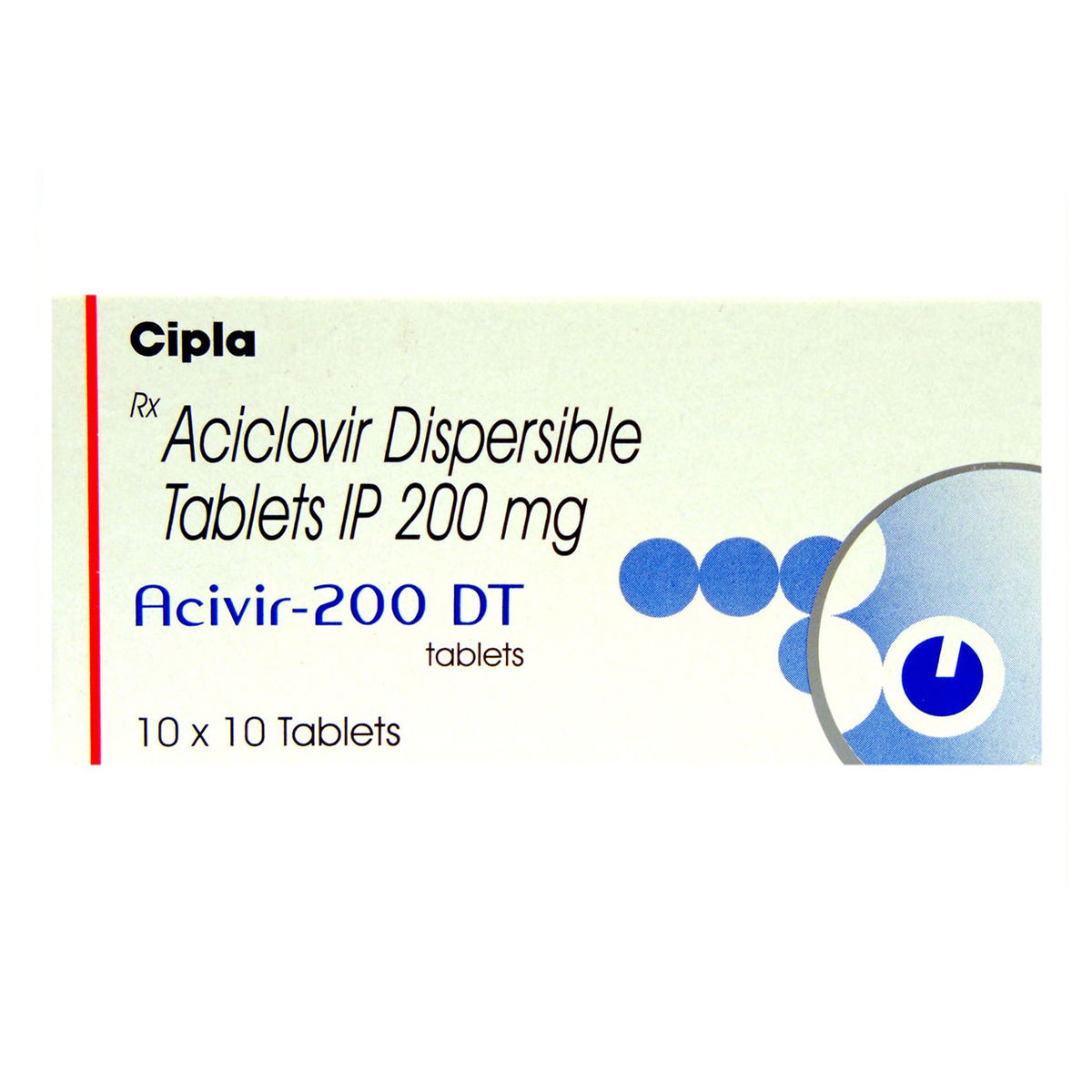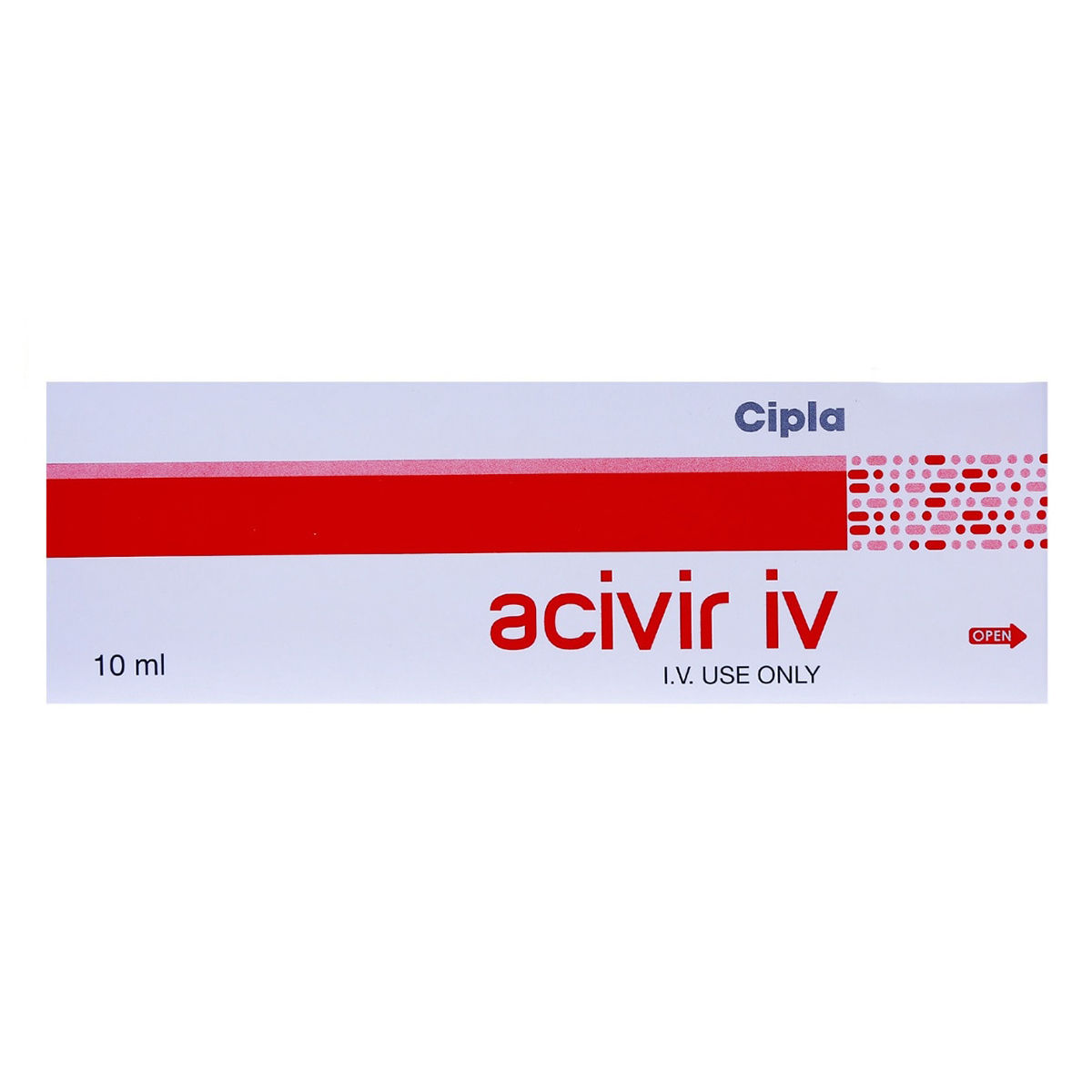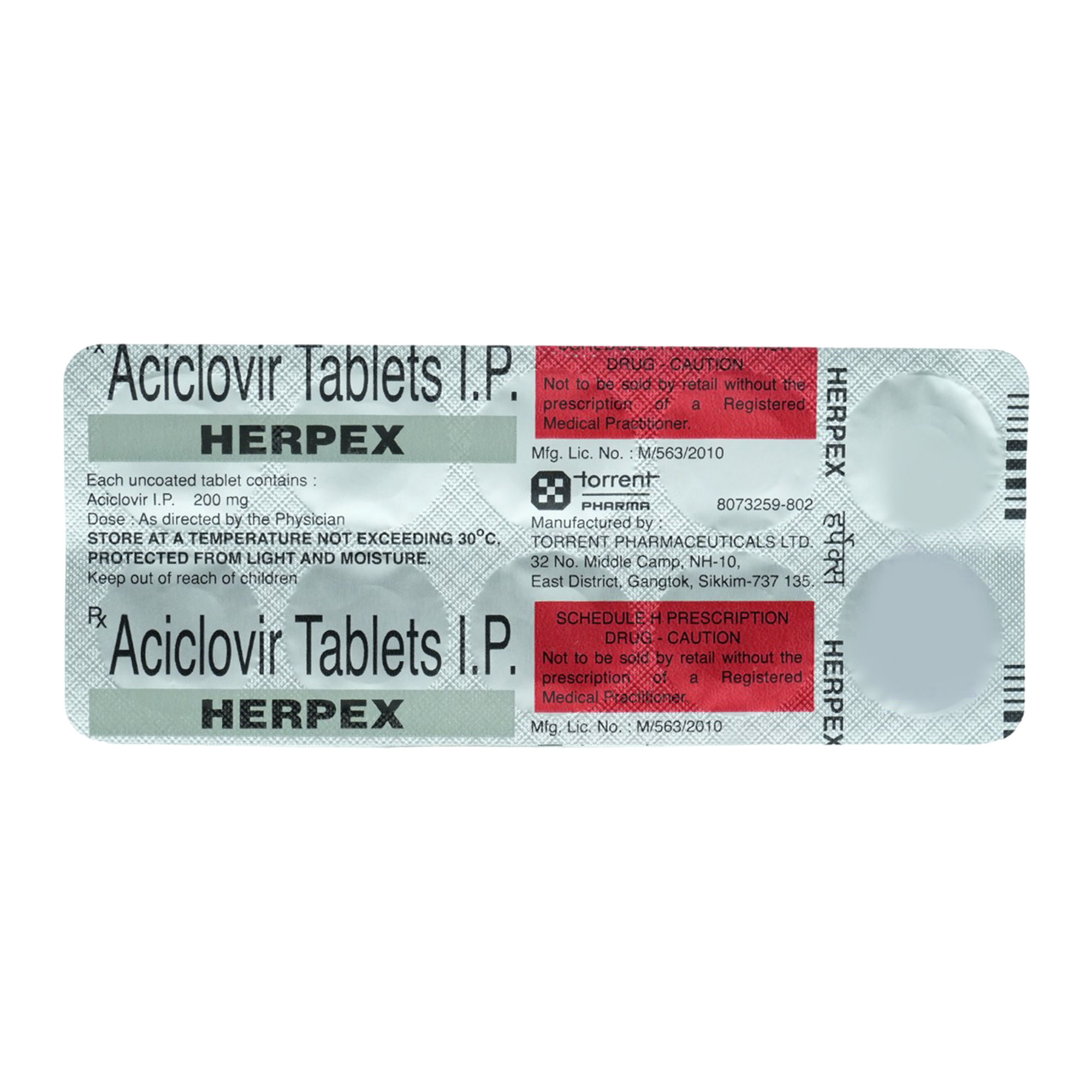Aciclovir
About Aciclovir
Aciclovir is used to treat viral infections. It plays a vital role in treating cold sores (an inflamed blister in or near the mouth, caused by infection with the herpes simplex virus), genital herpes (a common sexually transmitted infection marked by genital pain and sores), and herpes zoster (a viral infection that causes a painful rash). In addition to this, it is also used to treat chickenpox. Aciclovir does not cure herpes but does not allow the infection to spread and treat its symptoms.
Aciclovir contains Aciclovir, which is an antiviral medication. Aciclovir prevents the multiplication of viruses in human cells by acting on their DNA, resulting in decreased viral overload.
Aciclovir is taken with or without food in a dose and duration as advised by the doctor. The dose you are given will depend on your condition. In some cases, you may experience headaches, feeling dizzy, feeling or being sick (nausea or vomiting), diarrhoea, rash, and skin sensitivity to sunlight. Most of these side effects of Aciclovir are temporary, do not require medical attention, and gradually resolve over time. However, if the side effects are persistent, reach out to your doctor.
Take Aciclovir only if the doctor prescribes you. Never encourage self-medication or suggest your medicine to someone else. Do not take Aciclovir if you are allergic to Aciclovir, aciclovir, or any of its ingredients. Check with your doctor if you're pregnant, currently breastfeeding, or taking any other prescribed or non-prescribed medicines. Use protection while having sexual intercourse to avoid the transfer of genital herpes (a sexually transmitted disease) to your partner. If you have a weak immune system, please inform your doctor before taking Aciclovir as a dose adjustment may be required.
Uses of Aciclovir
Medicinal Benefits
Aciclovir contains Aciclovir, which is an antiviral medication. Aciclovir prevents the multiplication of viruses in human cells by acting on its DNA resulting in decreased viral overload.
Directions for Use
Storage
Side Effects of Aciclovir
- Headaches
- Feeling dizzy
- Feeling or being sick (nausea or vomiting)
- Diarrhoea
- Rash
- Skin sensitivity to sunlight
Drug Warnings
Do not take Aciclovir if you are allergic to Aciclovir or any of its ingredients. Inform your doctor about all other OTC medications, vitamins, nutritional supplements, and herbal products you are taking or plan to take. If you are 65 years of age or have kidney disease or kidney transplant, heart problem or history of heart problem, have HIV/AIDS, are pregnant, or plan to become pregnant, Aciclovir should be taken with caution and only if a doctor prescribes you. Aciclovir may cause dizziness, lightheadedness, and fainting when you get up too quickly from a lying position, especially when you start taking Aciclovir so please get up gradually. Also, do not drive a car or operate any machinery which requires concentration as Aciclovir may cause dizziness. Please do not take Aciclovir if you have ever developed a rash due to fever. Use protection while having sexual intercourse to avoid the transfer of genital herpes (a sexually transmitted disease) to your partner. If you have a weak immune system, please inform your doctor before taking Aciclovir as a dose adjustment may be required. Drink plenty of fluid as Aciclovir can cause dehydration and kidney damage.
Drug Interactions
Drug-Drug Interaction: Aciclovir may have an interaction with medication used to treat gout (probenecid), treat stomach ulcers (cimetidine), stop your body from rejecting transplanted organs (mycophenolate mofetil), treat asthma (aminophylline, theophylline).
Drug-Food Interaction: Aciclovir interacts with non-prescription medications, vitamins, nutritional supplements, and herbal products you are taking or plan to take.
Drug-Disease Interaction: Inform your doctor if you have or had renal dysfunction or disease, hemodialysis (a procedure where a dialysis machine and a special filter called an artificial kidney, or a dialyzer, are used to clean your blood), and organ transplant, Immunodeficiency, bone marrow transplantation, and Neutropenia (lower-than-normal levels of neutrophils).
Drug-Drug Interactions Checker List:
Safety Advice

Alcohol
cautionLimit alcohol intake while using Aciclovir to prevent any adverse effects.

Pregnancy
cautionAciclovir is a pregnancy Category B medicine. It is not known whether Aciclovir will affect pregnant women or fetus or not. Hence, the intake of Aciclovir should be only if prescribed and under medical supervision.

Breast Feeding
cautionAciclovir is a pregnancy Category B medicine. It is not known whether Aciclovir will pass through the milk in breastfeeding women or not. Hence, Aciclovir should only be taken if prescribed by a doctor and under medical supervision.

Driving
cautionAciclovir can affect alertness and coordination. So, operating machinery which requires concentration should be avoided.

Liver
safe if prescribedAciclovir is safe if prescribed by a doctor. It is known not to interact with liver functioning.

Kidney
cautionAciclovir to be taken with caution, especially if you have a history of Kidney diseases/conditions. The dose may have to be adjusted by your doctor.

Children
safe if prescribedAciclovir is safe if prescribed by a child specialist.
Habit Forming
Diet & Lifestyle Advise
Avoid alcoholic beverages with Aciclovir as it can make you dehydrated and may affect your sleep.
Try to include heart-healthy omega 3 fatty acid containing food drinks in your daily diet. You can also use low-fat cooking oil like olive oil, soybean oil, canola oil, and coconut oil.
Include turmeric or yellow mustard in your diet to avoid constipation caused by antiviral drugs and increase the intake of fluids to stay hydrated.
Take enough of Vitamin D and fresh air as it is known to improve the symptoms of herpes infection.
Try to reduce emotional and physical stress by spending time with family or whatever makes you happy.
Eat a healthy and balanced diet, and make sure you sleep at least 8 hours a day for a speedy recovery.
If you are going in strong sunlight, please wear a lip balm SPF 15 or higher, and Aciclovir makes you sensitive to UV and sunlight.
Patients Concern
Disease/Condition Glossary
Herpes zoster(shingles): It is a viral infection that causes a painful rash that causes red skin rashes and pain and burning. The virus lives in your nervous system for years before causing Herpes. It can appear on your face, neck, torso, and one side of the body. It can occur in and around the eyes, also known as ophthalmic herpes zoster. Antiviral medicines can help in the treatment of shingles (Herpes Zoster) Caused by the Varicella-Zoster virus.
Genital herpes infection: It is a common sexually transmitted infection; both men and women can be affected; in which the genitals are affected. Common symptoms include pain, irritation, itching, and sores in the genitals. Marked by genital pain and sores.
Herpes labialis: It is a kind of viral infection that affects the lip and is also known as cold sores. There is burning pain, and small blisters appear. In some patients, it can also lead to fever. Aciclovir helps in the healing process of cold sores.
Chickenpox: It is a viral infection that is highly contagious. Common symptoms include rash, small painful blisters, fever, sore throat, and body pain. Aciclovir tablet should be taken 24 or 48 hours after the onset of chickenpox (rash). Also, for a speedy recovery, avoid contact with other people who have chickenpox and maintain good hygiene.
FAQs
Aciclovir is used to treat viral infections. It plays a vital role in treating cold sores (an inflamed blister in or near the mouth caused by infection with the herpes simplex virus), genital herpes (a common sexually transmitted infection marked by genital pain and sores), and herpes zoster (a viral infection that causes a painful rash). In addition to this, it is also used to treat chickenpox.
Aciclovir works by preventing the multiplication of viruses in human cells. As a result, this stops the proliferation of viruses and produces new viruses, slowly leading to the viral infection clearing up. Take Aciclovir preferably first thing in the morning as generally it is taken after every 4 hours.
Aciclovir is used to treat viral infections. It plays a vital role in treating cold sores (an inflamed blister in or near the mouth, caused by infection with the herpes simplex virus), genital herpes (a common sexually transmitted infection marked by genital pain and sores), and herpes zoster (a viral infection that causes a painful rash). In addition to this, it is also used to treat chickenpox.
No, Aciclovir should not be taken if you have HIV (Human Immuno Deficiency Syndrome). It can increase the risk of Thrombotic Thrombocytopenic Purpura (blood clot formation in small blood vessels).
No, Aciclovir should be taken in the dose and duration as advised by the doctor. If you take it in more than the recommended dose, it might cause unpleasant side effects. If you think your symptoms are not improving, please consult your doctor.
If you miss a dose of Aciclovir, take the missed dose as soon as you remember it. However, if it's almost time for the next dose, do not take a double dose to make up for a missed one.
No, Aciclovir does not cure herpes infection. Instead, it reduces pain and itching caused due to it and prevents a new sore formation.
Do not stop taking Aciclovir without talking to your doctor. If you suddenly stop taking Aciclovir, you may experience confusion, fever, mental state changes, or severe muscle stiffness. Your doctor will probably decrease your dose gradually depending upon your disease condition.
No, Aciclovir is not known to affect contraception (condoms). Also, to avoid transmission of herpes infection as it is a sexually transmitted disease; please use any form of contraception.
Aciclovir helps treat shingles and suppress its symptoms. It does not cure shingles.
Aciclovir stops the spread of the herpes virus in the body. It may not stop the spread of the infection to other people. Practise safe sex and wash your hands regularly to prevent transmission of infection to others.
Serious side effects of Aciclovir are blood in the urine, chest pain or palpitations, hair loss, kidney problems, low blood pressure, lymph node swelling, seizures, serious skin reactions, and mental health changes such as agitation or aggression, confusion, depression, hallucinations, and psychotic symptoms.
Yes, elderly patients need to be more careful while taking Aciclovir as they might be more sensitive to the side effects of this medicine.
Taking more than the recommended dose of Aciclovir may cause an overdose. The symptoms of overdose include extreme tiredness, seizures (fits), change in the amount of urine, loss of consciousness and agitation. If you suspect you have taken overdose or notice signs of overdose, please consult a doctor immediately.
Common side effects of Aciclovir are headaches, feeling dizzy, feeling or being sick (nausea or vomiting), diarrhoea, rash, and skin sensitivity to sunlight. Most of these side effects of Aciclovir are temporary, do not require medical attention, and gradually resolve over time. However, if the side effects are persistent, reach out to your doctor.
Aciclovir should be used during pregnancy or breastfeeding only if prescribed by the doctor. Please consult the doctor if you are pregnant, planning for pregnancy or breastfeeding.
Alcohol may not interfere with the working of Aciclovir. However, limit alcohol intake while using Aciclovir to prevent any adverse effects.
Patients with impaired immunity or having HIV may get resistant to Aciclovir treatment. Inform the doctor if you have HIV or low immunity.
No, hair loss caused due to Aciclovir is not permanent. It stops on discontinuing the medicine.










